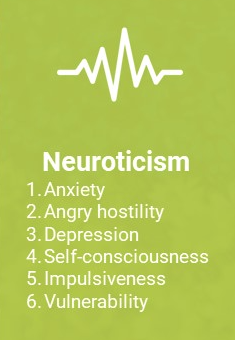Neuroticism

Neuroticism is one of the five dimensions of personality of the IPIP NEO Personality Inventory. Freud originally used the term neurosis to describe a condition marked by mental distress, emotional suffering, and an inability to cope effectively with the normal demands of life. He suggested that everyone shows some signs of neurosis, but that we differ in our degree of suffering and our specific symptoms of distress. Today neuroticism refers to the tendency to experience negative feelings. Those who score high on Neuroticism may experience primarily one specific negative feeling such as anxiety, anger, or depression, but are likely to experience several of these emotions. People high in neuroticism are emotionally reactive. They respond emotionally to events that would not affect most people, and their reactions tend to be more intense than normal. They are more likely to interpret ordinary situations as threatening, and minor frustrations as hopelessly difficult. Their negative emotional reactions tend to persist for unusually long periods of time, which means they are often in a bad mood. These problems in emotional regulation can diminish a neurotic’s ability to think clearly, make decisions, and cope effectively with stress.
At the other end of the scale, individuals who score low in neuroticism are less emotionally reactive. It is less easy to upset them. They tend to be calm, emotionally stable, and free from persistent negative feelings. Freedom from negative feelings does not mean that low scorers experience a lot of positive feelings; frequency of positive emotions is a component of the Extraversion domain.
Neuroticism Score
Low Neuroticism
Your score on Neuroticism is low, indicating that you are exceptionally calm, composed and unflappable. You do not react with intense emotions, even to situations that most people would describe as stressful.
Average Neuroticism
Your score on Neuroticism is average, indicating that your level of emotional reactivity is typical of the general population. Stressful and frustrating situations are somewhat upsetting to you, but you are generally able to get over these feelings and cope with these situations.
High Neuroticism
Your score on Neuroticism is high, indicating that you are easily upset, even by what most people consider the normal demands of living. People consider you to be sensitive and emotional.
Neuroticism Facets
- Anxiety. The “fight-or-flight” system of the brain of anxious individuals is too easily and too often engaged. Therefore, people who are high in anxiety often feel like something dangerous is about to happen. They may be afraid of specific situations or be just generally fearful. They feel tense, jittery, and nervous. Persons low in Anxiety are generally calm and fearless.
- Anger. Persons who score high in Anger feel enraged when things do not go their way. They are sensitive about being treated fairly and feel resentful and bitter when they feel they are being cheated. This scale measures the tendency to feel angry; whether or not the person expresses annoyance and hostility depends on the individual’s level on Agreeableness. Low scorers do not get angry often or easily.
- Depression. This scale measures the tendency to feel sad, dejected, and discouraged. High scorers lack energy and have difficult initiating activities. Low scorers tend to be free from these depressive feelings.
- Self-Consciousness. Self-conscious individuals are sensitive about what others think of them. Their concern about rejection and ridicule cause them to feel shy and uncomfortable abound others. They are easily embarrassed and often feel ashamed. Their fears that others will criticize or make fun of them are exaggerated and unrealistic, but their awkwardness and discomfort may make these fears a self-fulfilling prophecy. Low scorers, in contrast, do not suffer from the mistaken impression that everyone is watching and judging them. They do not feel nervous in social situations.
- Immoderation. Immoderate individuals feel strong cravings and urges that they have difficulty resisting. They tend to be oriented toward short-term pleasures and rewards rather than long- term consequences. Low scorers do not experience strong, irresistible cravings and consequently do not find themselves tempted to overindulge.
- Vulnerability. High scorers on Vulnerability experience panic, confusion, and helplessness when under pressure or stress. Low scorers feel more poised, confident, and clear-thinking when stressed.
